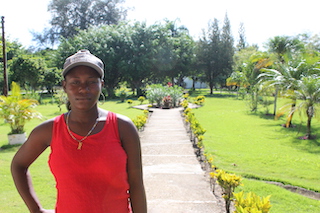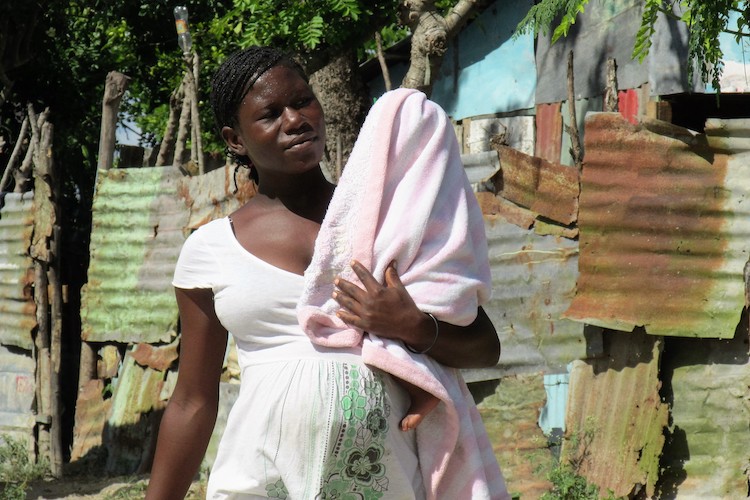Thank you Reconoci.do for Changing my Life

Shalin Charles Deni (1993) Batey Canutillo, San Pedro de Macorís. She is in the 5th grade in primary school, has two children and is currently not working. She has a national identity and electoral card.
My name is Shalin Charles Deni. I was born in 1993 at the Quisqueya municipality hospital on May 1st. I grew up in the Batey Canutillo. Since my parents left Haiti, they’ve always lived here. This is where they built their home, where they had their five children: Shalin, Miledi, Yolandita, Eddi and Linda, but she died on November 24, 2015. She died of an illness called pneumonia. When we were children, my parents declared us with the documents they had, which were the old cédula (ID) from the era of Balaguer.
When I turned eighteen, I went to the Junta Central of Los Llanos. They asked me for my parents’ documents, and I handed them to the secretary. After she reviewed the documents, she gave them back to me, and told me to sit down. Half an hour later, she called my name: “Shalin Charles,” and she gave me the copy of my birth certificate for the purpose of getting the ID. I took a photo, and I was told to leave, that they would call me. Months and months passed… and they never called me.
One day I went back to the Junta Central to find out what was happening. They looked me up in the system and told me they were investigating my documents, and [the secretary] told me they would call me. I asked the secretary if that investigation was going to take a long time, she replied that she didn’t know. In three weeks I went back to the Board, and I was told I had to go to the capital and go to the Inspectorate office [Inspectoría] to get a response. But I was told the same thing, that these documents had already been reviewed, but they didn’t give them to me because my parents were Haitian. I felt depressed, and lost the will to carry on. I was afraid to leave my house, worried that Immigration officers would grab me and take me to a country where I did not know anyone and I had never been to. I cried every day, every night and every moment I felt that there was no solution for my problem. But every night—before I went to bed— I asked God to give me strength and patience, and to solve my documentation problem and God listened to me…
One day a young woman named Marena came to my house. She was a community leader. She told me she was looking for children of Haitian parents that were not able to get their documents from the Junta Central. I felt so happy that tears flowed. She sat down and I told her what happened. She told me about an organization called Reconoci.do that is helping young people that have problems with their documents, and that they made trips to Congress whenever there were protests.
I went to every protest and every march that was organized. I never stayed home. If there was a meeting, wherever the Reconoci.do group went, there I was. One day, a group of young people made a trip to the Junta Central and I was one of them. When we arrived, we gave them our documents and we were told we couldn’t get our IDs because of Resolution 121 and the “infamous” Sentencia2 issued by the Constitutional Tribunal. This is when I realized what had been going on with me. Since I joined the Reconoci.do movement, my life completely changed. I felt stronger. I was eager to fight.
One day, I’m sitting on my porch, it’s around 4 p.m., some inspectors from the Junta Central came over to deliver a document from the Junta. When I asked the inspector what this document was about, he told me I was being sued by the Junta Central. When I said: “Why is the Junta suing me?,” he told me that it was a claim to nullify my birth certificate. I couldn’t hold the tears back and I started to cry. I called a young man named Isidro,3 he was the community coordinator for Reconoci.do. He told me to take the documents to the lawyer. She (the lawyer) told me not to worry, that everything was going to be taken care of. They sent me three nullification claims. I didn’t know what to do. I…even thought about taking my life…because if I had no documents, how was I going to live in this discriminatory and abusive country?
After a few months, I gave birth to my daughter named Rosarlin. She was born on September 21, 2012. When I was discharged, they didn’t want to let me out of the Antonio Musa Hospital, because I didn’t allow them to register my daughter in the immigration book. I wanted to register my daughter in the “normal” book [for Dominicans]. My girl did not belong to any other country because where she is born is where she belongs.
I argued with the secretary, I said, “My daughter was born here, she is as Dominican as you are,” but she told me that if my parents were Haitian, I was Haitian, and so was my daughter. I had so much rage I could not hold back the tears, I started to cry. Heartbroken, I called Isidro and told him what happened. He told me that under no circumstance was I to accept the pink slip [for foreigners]. He said he was at a meeting of Reconoci.do in Bonó and wouldn’t be done until much later. And he said: “Don’t you worry, tomorrow, God willing, Rosa Iris and I will be there.” Rosa Iris was also a leader of the movement.
Later, at about nine o’clock at night, Isidro arrived with a bag of pampers and sent my sister to buy me some dinner, and he said: “I had to give RD $100 for the doorman to let me up”. While he was talking to me, I couldn’t hold back the tears, the pain I felt in my chest was so intense it hurt when I swallowed. Isidro left.
The next morning, he returned with Rosa Iris. When they entered my room, I felt relief, like a burden was lifted. When Rosa Iris went to the office where they issued the live birth papers, about half an hour later, Isidro comes in with a big smile on his face and he says: “Come sign and have your sister Lismena pick up your things, because we are leaving…”
I felt so happy that I started calling Isidro “compadre” and Rosa Iris “comadre”, and also to my “comadre” Yulisa, who also participated in the rescue. They gave my girl a white slip [for Dominicans]. A few months later the famous list that the Junta had published came out, and if your name appeared on that list, your documents could be issued to you. That list came out with my name on it, and I went to get my national identity card, but they “transcribed” [my birth certificate]—every child of Haitian migrants was put in a separate book, if your parents are Dominican they put you in another book. Who says that they weren’t going to mix vanilla and chocolate? But, in my heart, I felt that we are all the same, of different colors, but we are all brothers and sisters.
When I declared my daughter, they gave me a receipt to retrieve the birth certificate. They told me to come back in two months, to see if the ruling had been issued. After three months, I went to get my girl’s birth certificate, but they sent me to the Minor’s Tribunal to see if the court ruling had been issued. They told me the court decision hadn’t been issued yet.
In two weeks I went back to the San Pedro de Macorís Office, they told me that the court decision had already come out and to pay RD $300 for the original birth certificate. They handed me my daughter’s birth certificate when I gave her my ID: and I had my daughter’s birth certificate in my hand. I had immense joy and felt so much happiness that I thought I was living a dream. But, my fight was not in vain: thanks to God and Reconoci.do today I have my ID, my Senasa [public health] insurance card and I was able to declare my two children: my girl Rosarlis Charles and Hansel Charles.
Thank you Reconoci.do for always supporting me, for crying with me, for not turning your back on me when I needed you most. I always pray to God to keep Reconoci.do ready to fight and for an end to racial discrimination. May God always bless that movement and accompany it, always… thank you Reconoci.do for transforming my life, for not letting that criminal ruling end my life and my future.

-
In reference to a 2007 resolution that enabled agents of the Junta Central to question the validity of the citizenship of anyone whose documents they deemed suspicious. ↩︎
-
In reference to TC 168-13 (Constitutional Tribunal 168-13), a September 23rd, 2013 ruling which retroactively denationalized more than 4 generations of Dominicans of Haitian Descent. ↩︎
-
Isidro Berique ↩︎